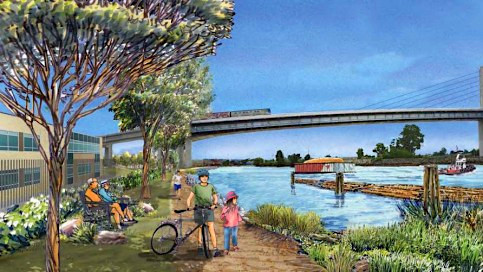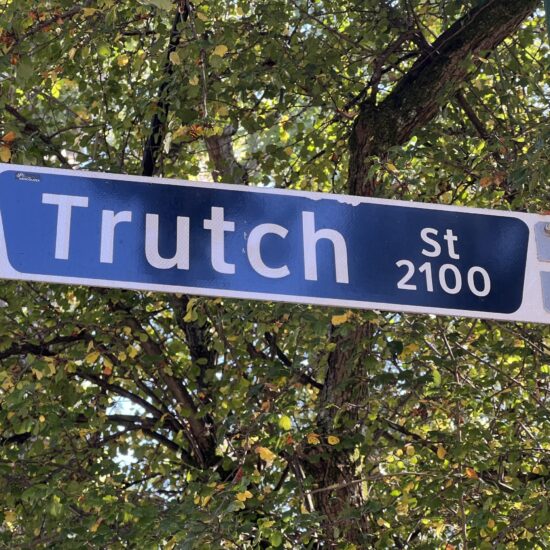
Bob Mackin
The executive director of the Marpole Business Association wants Vancouver city council to ensure public access to the Fraser River if it approves a staff-recommended road exchange to enable TransLink’s Marpole Transit Centre project.
Marpole community coalition has spent two years lobbying TransLink and city hall to build a trail by the Fraser River foreshore. The 2014 Marpole Plan had envisioned a 10-acre park.

Rendering of proposed green space by the Fraser River, near TransLink’s bus barn (City of Vancouver)
In a letter to the July 25 city council meeting, Claudia Laroye said she supports a proposed amendment to the road exchange so that staff can explore a waterfront walking path.
“We request that the city begin discussions with TransLink and the Musqueam on the
form of the walkway as soon as possible, and determine how a higher elevation level
path and modified and restored foreshore may contribute to the ecological health of the Fraser River ecosystem,” said Claude Laroye’s letter.
The staff report said public access would be improved by extending Laurel Street and providing a “contiguous development site and improved access for TransLink’s proposed transit facility.”
The Marpole Transit Centre is designed for 300 battery electric and conventional buses, plus 25 agency support vehicles, on industrial land between West Kent Avenue South and the Fraser River, adjacent to the Canada Line Bridge and bisected by Heather Street. Development Permit Board approved the matter on May 1. The $300 million project is slated for 2027 completion.
TransLink CEO Kevin Quinn’s May 10 letter to the Marpole-Oakridge Community Association said TransLink is in discussions with Musqueam Indian Band and Fisheries and Oceans Canada about various environmental mitigation measures. As for the riverfront walkway, Quinn said the design includes foreshore access on the east and west sides of the site if city hall and the Musqueam agree.
“Until a decision is reached between those parties, TransLink cannot pursue the development of a riverfront amenity, and so that element was separated from our application and will be considered once we receive direction from the city and Musqueam,” Quinn wrote. “However, in this application, we have worked closely with the City of Vancouver to incorporate enhancements into the site design that benefit the public, such as a landscaped multi-used path and green space on the east side of the site.”
Stanley Tromp, who has lived in the area for 17 years, two blocks from the proposed bus barn, said it is good news that both TransLink and city hall agree in principle on a trail at the river, but the staff amendment is “far too vague and uncommitted.”
“The current wording is outdated,” Tromp said. “The exploration is done. Finished. The amendment should be to direct staff to get on with it.”
Tromp said he accepts the full park is no longer feasible, but a trail would be a popular destination for both locals and tourists, so close to the Marine Drive Canada Line station.
As for the environmental and fisheries impacts of the new bus depot, Tromp said TransLink has produced three reports, but refuses to release them. He wants city council to require TransLink to release the reports immediately.
“These reports are public records, produced at public expense. Why are these secret?” Tromp said. “If the environmental conclusions were positive, then why does it not release them? How could this TransLink secrecy not raise public and councillor misgivings?”
Support theBreaker.news for as low as $2 a month on Patreon. Find out how. Click here.










